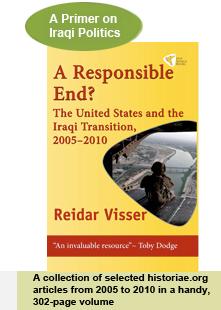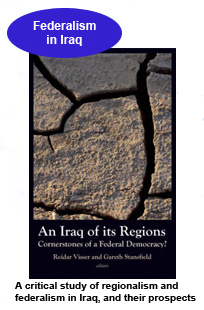



| Main | |
| Documents & images | |
| Links | |
| Contact | |
 | |
| amazon.com |

|
|
|
amazon.com
amazon.co.uk |
|

|
|
|
amazon.com
amazon.co.uk |
|
SCIRI More Flexible on Federalism, but Fails to Resolve Khamenei Ambiguity
By Reidar Visser (http://historiae.org)
12 May 2007
The Supreme Council for the Islamic Revolution in Iraq (SCIRI) held its general meeting in Baghdad on 10 and 11 May 2007. The 49-point press release from the conference is noteworthy for at least two reasons.
Firstly, the document represents a notable softening of tone on the question of federalism in Iraq. In 2005 and 2006, SCIRI held a high profile in advocating the establishment of a single Shiite region of nine governorates from Basra to Baghdad. This region is not mentioned in the recent press release; instead there is general praise for the idea of federalism and emphasis on the need to follow the Iraqi constitution in this question, where after all a single Shiite region is but one of several possible outcomes (and, in fact, a rather unlikely one at that, given the complicated procedures for forming a federal region). Indeed, the explicit mention in the press release of “governorates” among the building blocks of the future federal Iraq suggests that SCIRI is now moving away from the view that the entire country should necessarily become subdivided into federal regions.
This coincides with an appreciable decline in propaganda in favour of the single Shiite federal region in early 2007, and with rumours of SCIRI members having second thoughts on the wisdom of any such large-scale federal entity – not least due to popular resistance from inside the Shiite community. Instead, forces close to SCIRI have begun re-exploring the old idea of several small-scale regions south of Baghdad, as seen for instance in the vision of Iqlim al-Janub (Region of the South) limited to Basra, Maysan and Dhi Qar – an idea that for the past years has been the preserve of SCIRI’s archenemies in the south, such as the Fadila party. The sole mention in the press release of “the centre and the south” (the key elements of the name of the projected Shiite mega-region, the Region of the Centre and the South) is in a strictly geographical sense: in relation to a role for the tribes in ensuring local security, and as areas that have suffered particular deprivation in the past. Only when prompted by journalists at a news conference did SCIRI officials confirm that they were still in favour of the idea of a single Shiite region, but once again they stressed constitutionality and the role of the popular will above all. All in all, this could be signs of a constructive change of approach by SCIRI – and one that would be more in touch with Iraqi realities and the widespread scepticism among ordinary Iraqis to newfangled federalism ideas.
The second important point related to the press release is illustrated by the stark discrepancy between leaked information to the press by SCIRI officials prior to the publication of the document, and its actual contents on one key issue: SCIRI’s relationship with Iran generally, and with that country’s supreme leader, Ali Khamenei, in particular. Some early media reports suggested that SCIRI were about to formally renounce their ties to Khamenei, in favour of greater emphasis on the Grand Ayatollah Ali al-Sistani. That sort of loud and clear renunciation would have been immensely helpful to the Iraqi political process, and, along with a more flexible position on federalism, could have helped the party emerge as a true moderating force in Iraqi politics. Accusations against SCIRI of “pro-Iranian” and “Safavid” loyalties could then have been more easily consigned to the realm of conspiracy theories.
Ultimately, however, no such clarification of the party’s position was included in SCIRI’s press release. The only mention of Sistani was in a non-committal statement that SCIRI “valued” the efforts (already construed in the Western mainstream media as a decisive “pledge”) of the higher clergy in Iraq, including Sistani. (This of course reflects the fact that SCIRI does not have a reciprocal relationship with the leading Iraqi ayatollah; they need him more than he needs them.) True, the language of the press release is admirable and politically correct as such, with a condemnation of all external meddling in Iraqi affairs. But the failure to clarify SCIRI’s relationship to Khamenei means that considerable ambiguity on this issue remains. After all, Muhammad Baqir al-Hakim (whose portrait dominated the conference room, alongside that of Sistani) is one of the few Shiite clerics in history to have made specific proposals (such as the ‘Aqidatuna booklet from the 1990s) for a greater Islamic union of countries with strong Shiite communities like Iraq, Iran and Lebanon under the leadership of a single supreme leader (wali amr al-muslimin). Since 2003, SCIRI have simply toned down their pan-Islamic and pan-Shiite rhetoric, instead of elaborating an alternative framework where they explicitly could have redefined their views on the concept of a single supreme leader. (Here one must distinguish between wilayat al-faqih as the particular model of government in Iran and the more general principle of submission to the wali amr al-muslimin: the late Hakim is on record as saying that wilayat al-faqih may not be suitable for Iraq as an internal system of government due to the country’s sectarian complexity, but that is not the same as a renunciation of the idea of loyalty to a single supreme leader, or even of pan-Shiite federalism of the kind propagated in ‘Aqidatuna – where the subunits presumably may retain separate systems of domestic government while at the same time somehow remaining under a pan-Shiite umbrella.)
It is however interesting that the leaks prior to the publication of the SCIRI press release apparently came from SCIRI members who themselves were interested in marking some kind of break with Iran and Khamenei. This kind of desire among party members to stress their Iraqiness must have been the driving force behind some of the other points in the press release, such as the change of the name of the organisation to the Supreme Islamic Iraqi Council (presumably SIIC). It is an anomaly of Iraqi politics that there should be no well-organised party to represent the current associated with Sistani and his moderate Iraqi nationalist Islamism. The latest statement by SCIRI does not in itself quite suffice to fill that gap, but it does serve as an interesting indication that an internal debate on issues such as Iraqi nationalism and federalism may be underway within SCIRI. And if there has in fact been a real change in SCIRI’s programme on these important issues, SCIRI would win many friends in Iraqi politics by making this public in a coherent and comprehensive fashion, for all the world to see, instead of publishing bland documents like their latest press release.
This document may be freely reproduced as long as http://historiae.org is credited as the source.
